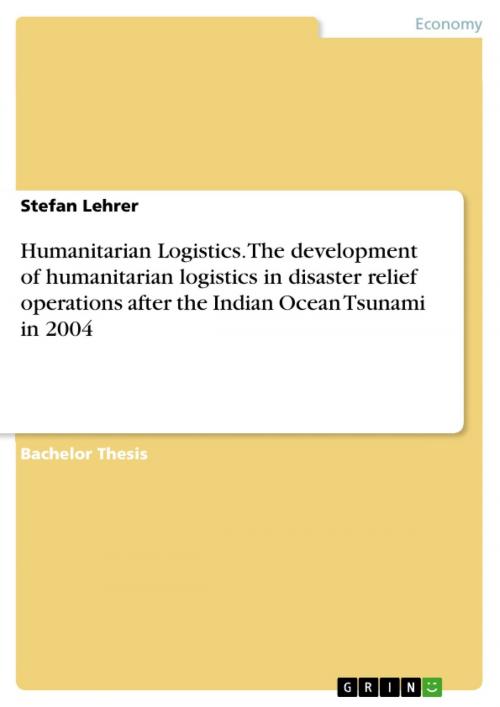Humanitarian Logistics. The development of humanitarian logistics in disaster relief operations after the Indian Ocean Tsunami in 2004
Business & Finance, Management & Leadership, Production & Operations Management| Author: | Stefan Lehrer | ISBN: | 9783668418851 |
| Publisher: | GRIN Publishing | Publication: | March 20, 2017 |
| Imprint: | GRIN Publishing | Language: | English |
| Author: | Stefan Lehrer |
| ISBN: | 9783668418851 |
| Publisher: | GRIN Publishing |
| Publication: | March 20, 2017 |
| Imprint: | GRIN Publishing |
| Language: | English |
Bachelor Thesis from the year 2015 in the subject Business economics - Supply, Production, Logistics, grade: 2,0, University of Applied Sciences Graz, language: English, abstract: Since the average number of disasters per year increased over the last few years, also the interest in humanitarian logistics amplified. The purpose of humanitarian logistics is to deliver relief supplies efficiently into affected regions in order to aid people in need. The aim of this paper is to determine if a positive development in the field of humanitarian logistics took place since 2004. Moreover it shall be investigated if the development status of a country has an influence on the efficiency in disaster relief operations. Therefore, operations in the field of humanitarian logistics will be divided into three phases in the theoretical part of this paper, namely: preparation, immediate response and recovery. Each phase will be described in detail at the beginning of this bachelor thesis and subsequently, three different disaster relief operations, which were conducted in 2004, 2010 and 2011, will be compared by reference to these phases. The selection of the catastrophes was based on two criterions: firstly, the catastrophes had to be similar in their magnitude and secondly, at least one disaster relief operation had to be conducted in an industrialized country. Based on the theoretical part of this paper, interviews with experts were conducted in order to gain insights into their way of thinking. The hypothesis 'There is a connection between the efficiency in a disaster relief operation and the development status of the country in which the operation is conducted' should serve as basis for this research. Furthermore, at the end of this paper it should be determined if the development in the field of humanitarian logistics is considered as positive by the experts or if there is a standstill in this regard.
Stefan Lehrer wurde 1990 in Voitsberg / Österreich geboren. Nach Abschluss an der Höheren Lehranstalt für wirtschaftliche Berufe in Deutschlandsberg startete der Autor seine akademische Laufbahn an der Fachhochschule Joanneum in Graz, wo auch sein Interesse für die humanitäre Logistik geweckt wurde. Nach Verfassung von 2 akademischen Arbeiten im Bereich der humanitären Logistik spezialisierte sich Stefan Lehrer in weiterer Folge im Bereich "Supply Chain Manager", wo er auch den gleichnamigen Masterstudiengang an der Fachhochschule Oberösterreich in Steyr besucht. Nach Abschluss dieses Studiums ist ein weiterer, beruflicher Werdegang in der humanitären Logistik denkbar.
Bachelor Thesis from the year 2015 in the subject Business economics - Supply, Production, Logistics, grade: 2,0, University of Applied Sciences Graz, language: English, abstract: Since the average number of disasters per year increased over the last few years, also the interest in humanitarian logistics amplified. The purpose of humanitarian logistics is to deliver relief supplies efficiently into affected regions in order to aid people in need. The aim of this paper is to determine if a positive development in the field of humanitarian logistics took place since 2004. Moreover it shall be investigated if the development status of a country has an influence on the efficiency in disaster relief operations. Therefore, operations in the field of humanitarian logistics will be divided into three phases in the theoretical part of this paper, namely: preparation, immediate response and recovery. Each phase will be described in detail at the beginning of this bachelor thesis and subsequently, three different disaster relief operations, which were conducted in 2004, 2010 and 2011, will be compared by reference to these phases. The selection of the catastrophes was based on two criterions: firstly, the catastrophes had to be similar in their magnitude and secondly, at least one disaster relief operation had to be conducted in an industrialized country. Based on the theoretical part of this paper, interviews with experts were conducted in order to gain insights into their way of thinking. The hypothesis 'There is a connection between the efficiency in a disaster relief operation and the development status of the country in which the operation is conducted' should serve as basis for this research. Furthermore, at the end of this paper it should be determined if the development in the field of humanitarian logistics is considered as positive by the experts or if there is a standstill in this regard.
Stefan Lehrer wurde 1990 in Voitsberg / Österreich geboren. Nach Abschluss an der Höheren Lehranstalt für wirtschaftliche Berufe in Deutschlandsberg startete der Autor seine akademische Laufbahn an der Fachhochschule Joanneum in Graz, wo auch sein Interesse für die humanitäre Logistik geweckt wurde. Nach Verfassung von 2 akademischen Arbeiten im Bereich der humanitären Logistik spezialisierte sich Stefan Lehrer in weiterer Folge im Bereich "Supply Chain Manager", wo er auch den gleichnamigen Masterstudiengang an der Fachhochschule Oberösterreich in Steyr besucht. Nach Abschluss dieses Studiums ist ein weiterer, beruflicher Werdegang in der humanitären Logistik denkbar.















